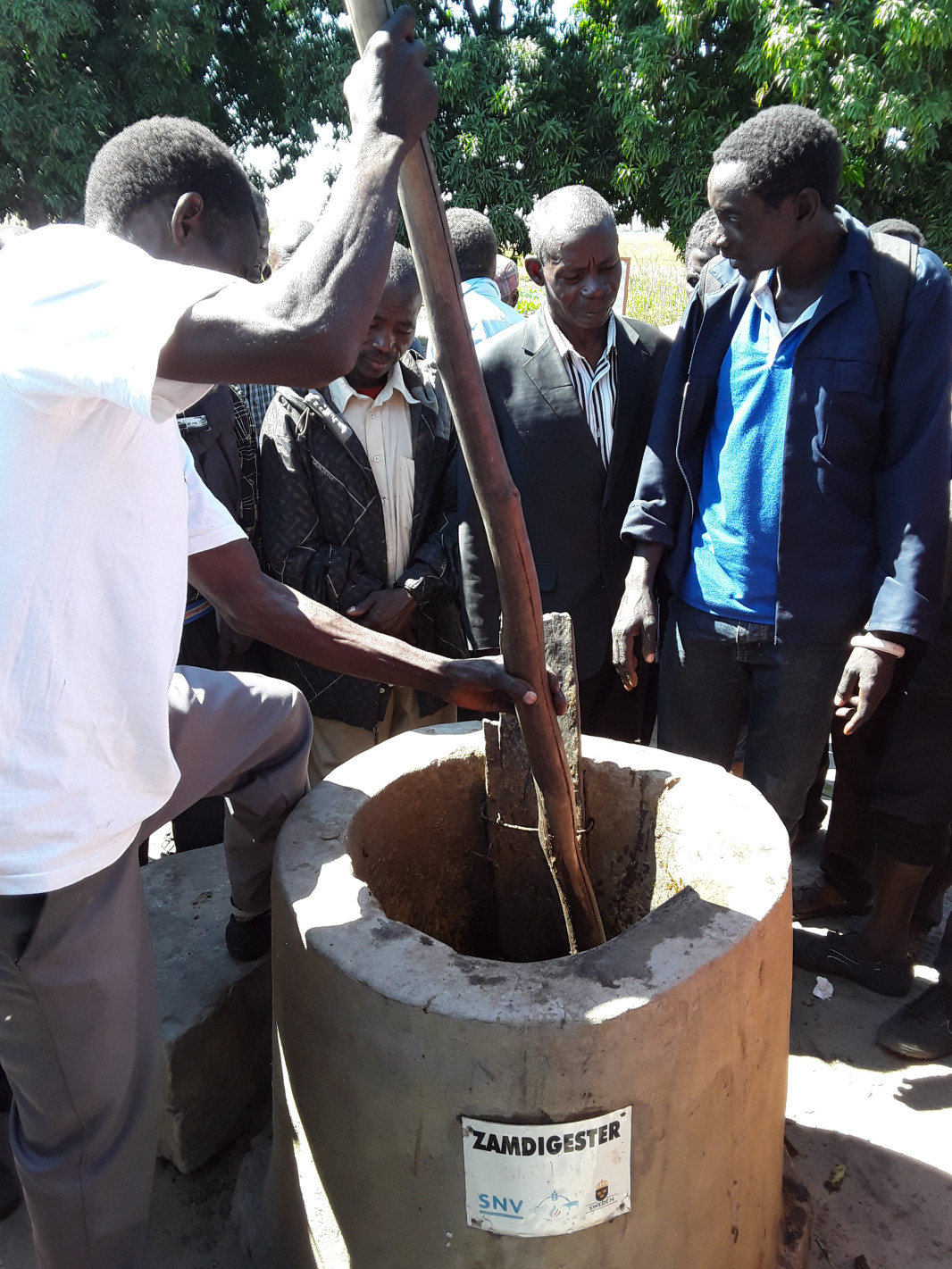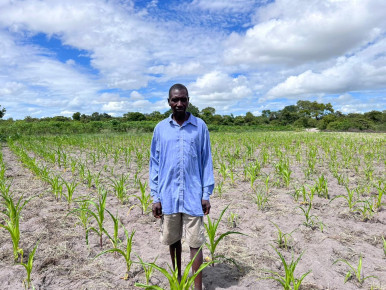Zambia: Climate resilience
Widespread improvements in the quality of life of many of the world’s populations have gone together with increased demands on natural resources. The planet is struggling to keep up, with increases in the average global temperature and the frequency of extreme weather events transforming ecosystems worldwide. Moreover, climate change impacts the world’s vulnerable people the most, many of whom lack the resources to adapt to new climate realities.
Our role in addressing climate change is to enhance the resilience of the people vulnerable to a changing climate and environmental degradation by harnessing solutions that align with green growth and circular economy principles, reducing greenhouse gas (GHG) emissions, and sequestering/storing carbon. In the locations where we work, greenhouse gas emissions per person are significantly lower than the global average. Yet, many of these populations are disproportionately affected by the adverse effects of climate change. Our focus is, therefore, on high-quality adaptation programming with the integration of mitigation where appropriate.
Our main areas of focus are:
Climate resilient food and livelihood systems: here, we take a systems approach to livelihoods to improve food and nutrition security in climate-change vulnerable areas. This approach means analysing the root causes of poverty and nutrition insecurity, using a gender lens to identify the challenges the target group faces, and using a participatory process to identify opportunities and potential solutions. Approaches within this thematic area may include support to diversify livelihoods, such as food processing and marketing, debt relief and establishing links with social protection services, and supporting existing agricultural livelihoods.
Climate-smart energy solutions: where resilience to climate change is improved through such measures as off-grid solutions, improved energy efficiency to reduce household costs or clean energy technology to reduce household air pollution, and measures that contribute to reducing GHG emissions.
Only 3.2% of inhabitants in Zambia are able to cook or use lights powered by electricity at home. Others most often use wood or charcoal, resulting in a substantially negative impact on the surrounding environment. It is estimated that using this source of fuel in Zambia results in significant deforestation, and up to 300 thousand hectares of soil are lost every year.People in Need works in the western province of Zambia in the district of Kalabo, which is among the poorest regions in Zambia. Up to 44% of households lack access to sanitary facilities as well as electricity and gas. Therefore, we are trying to help locals to attain long-term, sustainable sources (e.g., homemade bio-gas plants) which will not pollute the surrounding environment. By building new modern bio-gas plants not only do farmers gain the gas needed for cooking but they also acquire new skills and knowledge leading to the eco-efficient use of their livestock’s manure. Manure can be turned into a highly efficient organic fertiliser which can also lead to improved agricultural production.
Ongoing aidORPast aid programmes

Nature conservation in Western Zambia
People in Need and the World-Wide Fund for Nature are cooperating on the project "The Enhancing Livelihood Opportunities through Ecosystem Protection in the Barotse Floodplain of Western Zambia". This project aims to bolster the conservation efforts and enhance the livelihoods of communities in the Barotse Floodplain.
The Barotse Floodplain is an ecosystem crucial for the whole region. However, the population has recently faced challenges, such as unsustainable land management practices, inadequate food consumption, and poverty. These challenges put the ecological integrity and livelihoods of local communities—which depend on the floodplain—at risk.
Therefore, People in Need and the World-Wide Fund for Nature strive to conserve biodiversity, protect endangered species, and mitigate poverty via a holistic and sustainable approach focused on cooperation with communities and using nature-friendly methods.
The project is helping the region move toward clean energy, fight deforestation, support sustainable forestry management, and foster cooperation with local communities to strengthen ecosystem management.
The project is funded by Jersey Overseas Aid.

Sending life-saving messages to mothers and caregivers

Through Biogas Technology Towards Higher Resilience of Communities in Western Province of Zambia
As part of pilot projects in 2018 - 2019, People in Need introduced the potential of biofuel technology as a source of sustainable household energy and highly efficient organic fertilizer to the people of Zambia's Western Province. An alternative form of energy production in the form of biogas plants has proven to be an effective way to contribute to climate resilience and food security for smallholder farmers. The current follow-up project aims to continue raising awareness of biogas while helping to build an additional 130 biogas plants for residents in the Mongu and Kalabo districts of Zambia's Western Province.
Biogas plants use animal excrements and food scraps to produce gas that can serve households for cooking or lighting. The gas can replace the wood and charcoal that most people in the region rely on. In the absence of alternative energy sources, widespread deforestation and degradation of soil quality is taking place. The incidence of respiratory and eye diseases caused by charcoal use has been increasing, as well as reinforced gender inequalities. In fact, women and girls are disproportionately involved in fuelwood procurement, making it difficult for them to access education or income-generating activities. At the same time, biogas plants can produce high quality organic fertilizers. These help
increasing agricultural production and improve food security for vulnerable households affected by food insecurity related to the impact of both drought and the Covid-19 pandemic

Enhancing bioenergy in Western Province, phase II
The main objective of phase two is to help local communities transition to sustainable energy sources. Today, only 3.2 % of Zambia’s rural population has reliable access to electricity. Wood or charcoal is used as a primary energy source, which results in deforestation of the region, breathing problems, and is a drain on productivity (due to time spent collecting these raw materials).
Thanks to large-scale cattle breeding in the region, biogas plants are a natural fit for the local economic context. Farmers working predominantly on sandy soil need quality fertilizers, and biogas plants produce biogas for cooking and highly-effective organic fertilizer for field application.
Various information campaigns are being organized under the project focusing on the technology of biogas plants. These campaigns are carried out through media, as well as via trainings on biogas plant construction and operation, and organic fertilizer demonstrations. The project also helps local communities create markets for biogas products. Future initiatives could include providing access to financial services to help small farmers.

Access to energy in the Western Province

An integrated approach aimed at reducing malnutrition in the Western Province
The aim of this project is to lower the malnutrition rates in children under five, especially in households that are headed by women. In order to provide an increased intake of nutrition for these most vulnerable groups we are working together with the communities in several neighbouring regions using an integrated multi-sector approach. We provide people with seeds of resilient plants with high nutritional value, for example legumes such as peanuts, beans or bambara nuts and vegetables such as amaranth, onion, carrot or melon. The villagers can grow these not just for their own consumption, but with the assistance of trained local businessmen and women they can sell their products at local markets. This approach helps improve health and nutrition of families and assists in their financial self-sufficiency.
Besides agriculture, the project also provides training for the communities, health centres, and volunteers in relation to usage of drinking water and correct hygiene habits that help stop the spread of disease and lower the risk or greater malnutrition. Access to health services has major impact on the nutrition of children and mothers. Our team in Zambia will support the option for local women to give birth in health centres (currently more than half of all women give birth at home) and train local health volunteers in community-based treatment of malnourished children.






